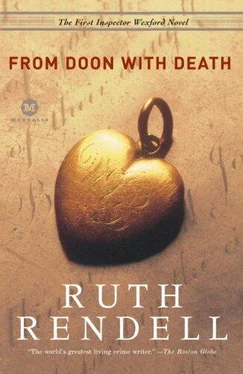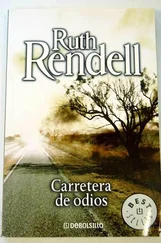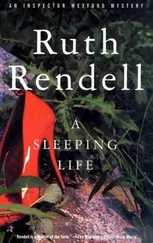The telephones had been silent for a long time now, an unusually long time for the busy police station. What had happened to the call they had been awaiting since lunchtime? Wexford seemed to read his thoughts almost uncannily.
‘We ought to hear from Colorado any minute,’ he said. ‘Calculating roughly that they’re about seven hours behind us in time, suppose Mrs Katz was out for the day, she’d be getting home just about now. It's half past twelve here and that makes it between five and six in the West of the United States. Mrs Katz has got little kids. I reckon she and her family have been out for the day and they haven’t been able to get hold of her. But she ought to be coming home about now and I hope they won’t be too long.’
Burden jumped as the bell pealed. He lifted the receiver and gave it to Wexford. As soon as he spoke Burden could tell it was just another bit of negative evidence.
‘Yes’ Wexford said. ‘Yes, thank you very much. I see. Can’t be helped … Yes, good night.’
He turned back to Burden. That was Egham, the handwriting fellow. He says Drury could have printed those inscriptions. There’s no question of the printing being disguised, but he says it was very mature for a boy of eighteen and if it’s Drury’s he would have expected a much greater development than Drury’s present specimen shows.
‘Moreover, there’s another point in his favour. I took a sample from the treads of his tyres and although they haven’t finished with it, the lab boys are pretty certain that car hadn’t been parked in a muddy lane since it was new. The stuff I got was mostly sand and dust. Let’s have some tea, Mike.’
Burden cocked his thumb at the door.
‘A cup for him, sir?’
*My God, yes,’ Wexford said. ‘How many times do I have to tell you? This isn’t Mexico.’
And I am sometimes proud and sometimes meek, And sometimes I remember days of old…
Christina Rossetti, Aloof
Margaret Godfrey was one of five girls on the stone seat and she sat in the middle of the row. Those who stood behind rested their hands on the shoulders of the seated. Wexford counted twelve faces. The snapshot Diana Stevens had taken was very sharp and clear and the likenesses, even after so long, were good. He re-created in his mind the face he had seen on the damp ground, then stared with awakened curiosity at the face in the sun.
The others were all smiling, all but Margaret Godfrey, and her face was in repose. The white forehead was very high, the eyes wide and expressionless; her lips were folded, the corners tilted very slightly upwards, and she was looking at the camera very much as the Gioconda had looked at Leonardo. Secrecy vied with something else in those serene features. This girl, Wexford thought, looked as if she had undergone an experience most of her fellows could never have fathomed, and it had marked her not with suffering or shame but simply with smug tranquillity.
The gym tunic was an incongruity. She could have worn a high-necked dress with puffy sleeves. Her hair, soft then, not crimped and waved as it had been later, skimmed her cheek-bones and lay across her temples in two shining arcs.
Wexford glanced across to the silent Drury, now sitting some five yards from him. Then, screening it once more with his hands, he looked long at the photograph. When Burden came in he was still gazing and his tea had grown cold.
It was almost three o’clock.
‘Miss Tipping is here,’ Burden said.
Wexford came out of the sunny garden, covered the snapshot with a file and said:
‘Let’s have her in, then.’
Janet Tipping was a plump healthy-looking girl with a cone of lacquered hair above a stupid suspicious face. When she saw Drury her expression, vacuous and uncomprehending, was unaltered.
‘Well, I can’t say’ she said. ‘I mean, it was a long time ago.’
Not twelve years, Burden thought, only four days.
‘ I could have served him. I mean, I serve hundreds of fellows with bitter…’ Drury stared at her, round-eyed, as if he was trying to drive recognition into her dim, tired consciousness. ‘Look here,’ she said, ‘I don’t want to get anybody hung.’
She came closer, peering, in the manner of one attracted by a monstrosity in a museum. Then she retreated, shaking her head.
‘You must remember me,’ Drury shouted. ‘You’ve got to remember. I’ll do anything. I’ll give you anything if you’ll only remember. You don’t realize, this means everything to me…’
‘Oh, do me a favour,’ the girl said, frightened now. ‘I’ve racked my brains and I don’t remember.’ She looked at Wexford and said, ‘Can I go now?’
The telephone rang as Burden showed her out. He lifted the receiver and handed it to Wexford.
‘Yes … yes, of course I want her brought back,’ Wexford said. ‘That was Martin,’ he said to Burden outside. ‘Mrs Drury said she bought that rainhood on Monday afternoon.’
‘That doesn’t necessarily mean -‘ Burden began.
‘No, and Drury got in after six-thirty on Tuesday. She remembers because she was waiting for the tomatoes. She wanted to put them in a salad for their tea. If he wasn’t killing Mrs P., Mike, that was a hell of a long drink he had. For an innocent man he’s practically crazy with terror.’
Again Burden said, ‘That doesn’t necessarily mean -‘
‘I know, I know. Mrs Parsons liked them green and goosey, didn’t she?’
‘I suppose there wasn’t anything in the garden, was there, sir?’
‘Five nails, about a hundredweight of broken bricks and a Dinky Toy Rolls-Royce,’ Wexford said. ‘He ought to thank us. It won’t need digging in the autumn.’ He paused and added, ‘If he’s still here in the autumn.’
They went back into the office. Drury was sitting utterly immobile, his face lard-coloured like a peeled nut.
‘That was a mighty long drink, Drury,’ Wexford said. ‘You didn’t get home till after six-thirty.’
Drury mumbled, his lips scarcely moving: ‘I wanted the order. I hung about. There’s a lot of traffic about at six. I’m not used to drink and I didn’t dare to drive for a bit. I wanted to find Mr Spellman.’
Half a pint. Burden thought, and he didn’t dare to drive?
‘When did you first resume your relationship with Mrs Parsons?’
‘I tell you there wasn’t a relationship. I never saw her for twelve years. Then I was driving through the High Street and I stopped and spoke to her…’
‘You were jealous of Mr Parsons, weren’t you?’
‘I never met Parsons.’
‘You would have been jealous of anyone Mrs Parsons had married. You didn’t have to see him. I suggest you’d been meeting Mrs Parsons, taking her out in your car. She got tired of it and threatened to tell your wife.’
‘Ask my wife, ask her. She’ll tell you I’ve never been unfaithful to her. I’m happily married.’
‘Your wife’s on her way here, Drury. We’ll ask her.’
Drury had jumped each time the telephone rang. Now as it sounded again after a long lull, a great shudder passed through him and he gave a little moan. Wexford, for hours on tenterhooks, only nodded to Burden.
‘I’ll take it outside,’ he said.
Bryant’s shorthand covered the sheet of paper in swift spidery hieroglyphics. Wexford had spoken to the Colorado police chief, but now as he stood behind Bryant he could hear nothing of that thick drawl through the headphones, only watch the words fall on to paper in a tangled code.
By four it had been transcribed. His face still phlegmatic, but to Burden vital with latent excitement, Wexford read the letter again. The dead words, now coldly typed on official paper, seemed still to have the force of life, a busy bustling life led by a woman in a country backwater. Here in the depths of the night, among the office furniture and the green steel filing cabinets, Mrs Parsons was for a moment - one of the few moments in the whole case - resurrected and become a real person. There was no drama in her words and only the whisper of a small tragedy, but because of her fate the letter was a dreadful document, the only existing recorded fragment of her inner life.
Читать дальше











